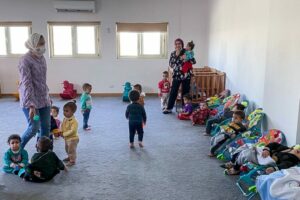ISMAILIA, Egypt – Sara Samer faced a hard choice: stay home to tend to her two daughters or undertake the near-impossible task of finding a workplace with a good kindergarten for her children in Ismailia, a city in northeastern Egypt on the west bank of the Suez Canal.
“I had lost all my hopes,” the 31-year-old garment worker tells Better Work. “My previous job didn’t provide employers with a creche, so I had to send my eldest daughter, Isra’a, to a private kindergarten in my village.” But then one problem followed another. Isra’a was often sick or suffering from stomach diseases due to the facility’s poor hygiene conditions. Samer says her daughter was also not receiving education or the attention she was meant to receive in childcare. The service’s cost had also become unsustainable, forcing Samer to make a difficult decision.
“I gave up and stayed home,” she says.
Women’s education is a priority in the Middle East and North Africa (MENA). Although almost all girls in the MENA region now attend school – and more women than men go to university – women’s participation in the workforce stubbornly remains among the lowest in the world. The World Bank found only 18% of the female workforce in Egypt is employed in the private sector. The research shows that many women are either reluctant to apply for jobs for fear of competition, or they believe it’s unlikely to find a suitable job.
But Samer wanted her story to be different. She decided to give her career another chance, seeing setbacks as tests of her resilience. A new factory opened in Ismailia in 2019, providing its employees with a state-of-the art kindergarten for their children. Samar, who meanwhile had another baby, had no hesitation.

“I had to pinch myself to be sure I was not dreaming,” she says. She applied for a job and was hired by the new branch of Jade Textile, Egypt’s largest ready-to-wear exporter and a Better Work partner. This gave Samer the opportunity to focus on her career again, earning additional income to support her extended family.
Although Egypt recently implemented a string of measures to support women’s employment, including exceptional leave for mothers, an expansion in conditional cash transfers, increased monthly income for rural women, and special programs for women with disabilities, there’s a long road ahead.
“We believe that providing a nursery in factories is a key to women’s participation across the industry’s production chain,” says Moataz Abubakr, a manager with Jade Textile. Jade hopes to increase the percentage of women workers in the facility from 28% to 35% in 2022, Abubakr explains, acknowledging the pivotal role women could play within the country’s and region’s economy if given the opportunity and support.
Keeping women out of the labour market has a considerable negative impact on the economy, both domestically and regionally. Legal and social barriers hampering women’s access to jobs and careers in the MENA region is currently costing an estimated $575 billion a year, according to the Organisation for Economic Cooperation and Development (OECD). Egyptian women are no exception, representing an unexploited resource that could change the outlook of the country’s economy, if their potential is acknowledged and facilities and services are provided to support their access to the world of work, like nurseries.
“Jades’s kindergarten is open to children from six months to six years old,” says Abubakr, adding that the factory also provides transportation to and from the factory to its workers and their children. Five classrooms, two sleeping areas, one play yard, and a TV room currently accommodate 114 children of 83 female workers. Fourteen female teachers supervise the children, while one nurse is employed in the facility’s clinic. Starting at the age of four, children in the kindergarten are educated following the Oxford Montessori curriculum to prepare them for school that lies ahead.
“I am extremely happy,” Samer says. “Both Isra’a, four, and Mecca, almost two, are well tended to. The education and health care services are extremely good. I am more relaxed concerning their well-being during my shift as I can visit them during my breaks. We need more facilities like these in Egypt. This has helped me, my colleagues and could help millions of women across the country to get a job and a salary.